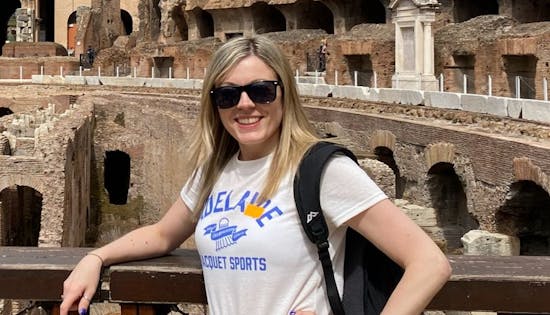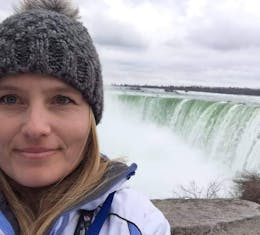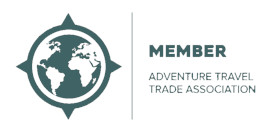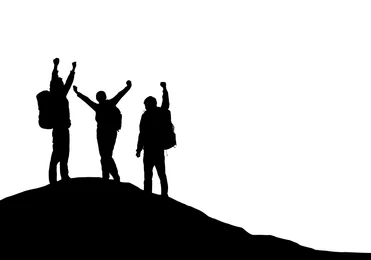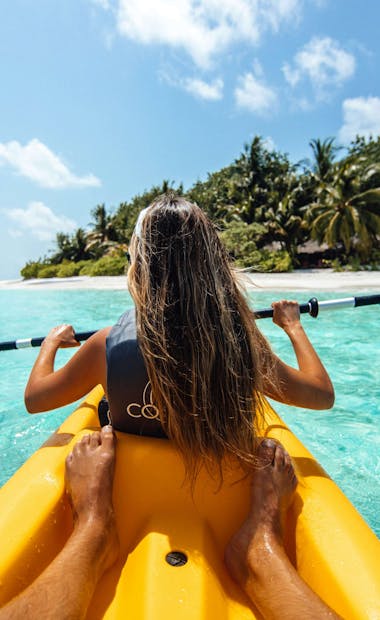Cambodia Tours
A paradise filled with jungles, jaw dropping waterfalls and world famous Angkor Wat
Popular tours
- Save26%
 View Tour
View TourCambodia: Ancient Ruins & Boat Rides - 10 Days
- Bangkok to Ho Chi Minh City
- Age group: 18 - 39
- Max group size: 18
Was:£809From£601  View Tour
View TourCambodia Intro - 10 Days
- Phnom Penh to Siem Reap
- Age group: 18 - 49
- Max group size: 20
From£829- Save26%
 View Tour
View TourCambodia Experience - 9 Days
- Ho Chi Minh City to Bangkok
- Age group: 12 - 100
- Max group size: 16
Was:£959From£712 - Save26%
 View Tour
View TourCambodia to Vietnam: Night Markets & Noodle-Making - 20 Days
- Bangkok to Hanoi
- Age group: 18 - 39
- Max group size: 18
Was:£1,409From£1,046 - Save26%
 View Tour
View TourClassic Cambodia - 6 Days
- Phnom Penh to Siem Reap
- Age group: 15 - 99
- Max group size: 12
Was:£810From£601 - Save26%
 View Tour
View TourUltimate Cambodian Adventure - 14 Days
- Phnom Penh to Phnom Penh
- Age group: 12 - 100
- Max group size: 16
Was:£1,319From£979
Cambodia Tours
Embark on an unforgettable adventure to the captivating kingdom of Cambodia, where ancient temples, vibrant culture, and breath-taking landscapes await. Our Cambodia tours and holidays promise an immersive experience that will leave you enchanted. Let us be your guide as we explore the wonders of this Southeast Asian gem.
Step back in time and marvel at the iconic Angkor Wat, a UNESCO World Heritage site and the largest religious monument in the world. As the sun casts its golden hues over the magnificent temple complex, you'll be transported to a bygone era of Khmer grandeur. Wander through the intricate carvings, hidden chambers, and ancient corridors, and let the mystique of this architectural masterpiece envelop you.
But Cambodia offers more than just Angkor Wat. Discover the enigmatic smiles of the Bayon temple, with its towering stone faces, or venture to the atmospheric ruins of Ta Prohm, where nature has intertwined with history, with tree roots engulfing the temple walls in a stunning display of symbiosis.
Beyond the ancient wonders, Cambodia is a country that captivates the soul with its vibrant culture and warm hospitality. Lose yourself in the bustling markets of Phnom Penh, where fragrant spices, colourful textiles, and handicrafts entice your senses. Immerse yourself in the lively street food scene, savouring delicious Khmer cuisine that tantalizes your taste buds with its delicate blend of flavour's.
For a glimpse into Cambodia's tragic past, visit the haunting Tuol Sleng Genocide Museum and the Killing Fields, where you can pay tribute to the victims of the Khmer Rouge regime and gain a deeper understanding of the country's history.
Nature lovers will be in awe of Cambodia's natural beauty. Cruise along the tranquil waters of Tonle Sap Lake, Southeast Asia's largest freshwater lake, where floating villages and an abundance of bird species await. Journey to the lush Cardamom Mountains, a haven for wildlife enthusiasts and eco-adventurers, offering opportunities for trekking, birdwatching, and immersing in the untouched beauty of the rainforest.
As you traverse the landscapes of Cambodia, you'll be embraced by the genuine warmth and kindness of its people, whose smiles will leave an indelible mark on your heart. Engage in the rich traditions of Cambodian culture, from traditional Apsara dance performances to learning the art of silk weaving.
Cambodia is a destination that offers a tapestry of experiences, where history, spirituality, and natural wonders converge. Let our Cambodia tours and holidays unlock the secrets of this enchanting land, where every step reveals a new chapter in the story of a country that has risen above adversity with resilience and grace. Prepare to be captivated by the ancient wonders, touched by the genuine smiles, and inspired by the spirit of Cambodia.
When is the best time to visit Cambodia?
The best time to visit Cambodia is during the dry season, which generally extends from November to April. This period offers pleasant weather with lower humidity and minimal rainfall, allowing you to explore the country comfortably.
November to February is particularly popular among travellers as the temperatures are cooler, ranging from 20 to 30 degrees Celsius (68 to 86 degrees Fahrenheit). This time of year is ideal for exploring the ancient temples of Angkor and other outdoor attractions, as the weather is generally sunny and pleasant.
March and April mark the peak of the dry season, with temperatures gradually increasing. During this period, temperatures can reach up to 35 degrees Celsius (95 degrees Fahrenheit), especially in April. Despite the rising temperatures, many visitors still enjoy Cambodia's attractions, such as the beautiful coastlines and beach resorts in Sihanoukville and Koh Rong.
The wet season in Cambodia, from May to October, is characterized by higher humidity and frequent rain showers, particularly in the afternoon or evening. However, the countryside becomes lush and green during this time, and the rain showers are usually short-lived, allowing for enjoyable travel experiences. The wet season also brings fewer crowds and lower prices, making it an attractive option for budget-conscious travelers.
It's important to note that weather patterns can vary from year to year, and there may be variations between different regions of Cambodia. It's a good idea to check the specific weather forecast for your intended destination and plan accordingly.
Ultimately, the best time to visit Cambodia depends on your preferences and the experiences you seek. Whether you choose the dry season for comfortable sightseeing or the wet season for a unique and budget-friendly adventure, Cambodia's charm and rich cultural heritage will leave an everlasting impression on your journey.
Will I need a visa to travel to Cambodia?
Yes, most travellers will require a visa to enter Cambodia. However, the specific visa requirements depend on your nationality and the purpose and duration of your visit. Here are some key points to consider:
Tourist Visa: If you are visiting Cambodia for tourism purposes, you can obtain a tourist visa upon arrival at the international airports in Phnom Penh and Siem Reap, as well as at certain land border crossings. The visa is valid for a stay of up to 30 days and can be extended for an additional 30 days at the Immigration Department in Phnom Penh or the Immigration Office in Siem Reap.
E-Visa: Alternatively, you can apply for an e-visa before your trip through the Cambodian Ministry of Foreign Affairs and International Cooperation's official website. The e-visa is also valid for a 30-day stay and allows entry through the same designated ports of entry as the on-arrival visa.
Visa Extension: If you plan to stay in Cambodia for longer than the initial 30-day period, you can apply for a visa extension at the Immigration Department or the Immigration Office. The extension allows for an additional 30 days of stay.
Business Visa: If you are visiting Cambodia for business purposes or intend to stay for an extended period, you will need to apply for a business visa before your trip. Business visas typically require sponsorship or an invitation letter from a Cambodian company or organization.
It's essential to check the visa requirements specific to your nationality and travel plans before your trip to ensure a smooth entry into Cambodia. It is recommended to review the official website of the Cambodian Ministry of Foreign Affairs and International Cooperation or consult with your nearest Cambodian embassy or consulate for the most up-to-date and accurate information regarding visa requirements.
Remember to have a valid passport with a minimum of six months' validity remaining from the date of entry into Cambodia. Additionally, it's a good idea to carry a printed copy of your visa approval (if applying online) or relevant documents for visa on arrival to present to immigration authorities upon arrival in Cambodia.
What are the must see destinations in Cambodia?
Cambodia is a country rich in history, culture, and natural beauty, offering a variety of must-see destinations for travelers. Here are some of the top attractions and must-visit destinations in Cambodia:
Angkor Archaeological Park (Siem Reap): The crown jewel of Cambodia, Angkor Archaeological Park is a UNESCO World Heritage site and home to the famous Angkor Wat temple complex. Explore the ancient temples of Angkor, including Bayon, Ta Prohm, and Banteay Srei, and witness the stunning blend of intricate carvings and architectural grandeur.
Phnom Penh: The vibrant capital city of Cambodia, Phnom Penh, offers a mix of history, culture, and urban charm. Visit the Royal Palace and Silver Pagoda, delve into Cambodia's tragic past at the Tuol Sleng Genocide Museum and the Killing Fields, and immerse yourself in the bustling markets and lively street food scene.
Sihanoukville: Nestled along the Gulf of Thailand, Sihanoukville is a coastal city known for its beautiful beaches and laid-back atmosphere. Relax on the white sands of Otres Beach, snorkel or dive in the crystal-clear waters of Koh Rong Samloem, or indulge in fresh seafood at the vibrant Serendipity Beach area.
Battambang: Located in north-western Cambodia, Battambang is a charming city renowned for its well-preserved colonial architecture and artistic scene. Take a ride on the bamboo train, visit the ornate temples, explore the traditional villages, and savour the local cuisine.
Kampot: Situated along the banks of the Kampot River, Kampot is a picturesque town known for its tranquil riverside setting and pepper plantations. Discover the French colonial architecture, cruise along the river, explore the nearby Bokor National Park, and sample the famous Kampot pepper.
Koh Ker: For a unique archaeological experience, venture to Koh Ker, a remote temple complex in north-eastern Cambodia. Marvel at the towering Prasat Thom pyramid temple and explore the lesser-known temples hidden in the jungle, offering a sense of adventure and exploration.
Tonle Sap Lake: Southeast Asia's largest freshwater lake, Tonle Sap is a vast ecological wonder that is home to floating villages, abundant wildlife, and unique floating markets. Take a boat tour to witness the daily lives of the locals and immerse yourself in the rich biodiversity of the lake.
These are just a few highlights of the many incredible destinations that Cambodia has to offer. Each region of the country has its own distinct attractions and charm, providing a diverse range of experiences for travellers. From ancient temples and historical sites to beautiful beaches and natural wonders, Cambodia is a country that will captivate your senses and leave you with unforgettable memories.
What is the local currency in Cambodia, and can I use credit cards?
The local currency in Cambodia is the Cambodian Riel (KHR). However, US dollars (USD) are widely accepted and even preferred for most transactions, particularly in tourist areas, hotels, restaurants, and larger establishments. It's a good idea to have a mix of US dollars and Cambodian Riel when traveling in Cambodia to ensure you can make purchases in both currencies.
While US dollars are widely accepted, it's important to note that you will receive change in Cambodian Riel for smaller transactions or when shopping at local markets. The exchange rate between US dollars and Cambodian Riel is approximately 1 USD to 4,000 KHR, but it can vary slightly.
Credit cards are accepted in many hotels, upscale restaurants, and larger businesses in major cities like Phnom Penh and Siem Reap. Visa and Mastercard are the most widely accepted credit cards in Cambodia, followed by American Express and Diners Club, which are accepted at some establishments but not as commonly.
It's advisable to carry some cash in small denominations for transactions at smaller shops, markets, and local vendors who may not accept credit cards. ATMs are widely available in cities and major tourist areas, allowing you to withdraw cash in either US dollars or Cambodian Riel. However, it's recommended to notify your bank or credit card provider of your travel plans to ensure your cards work smoothly and to inquire about any applicable fees or charges for international transactions.
Overall, having a mix of US dollars and Cambodian Riel, along with a credit card for larger purchases, will provide you with flexibility and convenience during your travels in Cambodia.
Is Cambodia a good destination for solo travellers?
Yes, Cambodia can be a fantastic destination for solo travellers. It offers a mix of unique experiences, cultural immersion, and warm hospitality, making it an excellent choice for those exploring the world on their own. Here are a few reasons why Cambodia is a good destination for solo travellers:
Friendly Locals: Cambodians are known for their friendliness and welcoming nature. As a solo traveller, you'll find that locals are often eager to engage in conversations, share their culture, and offer assistance when needed. This can make your solo journey more enjoyable and provide opportunities for meaningful interactions.
Safe Environment: Cambodia is generally considered a safe country for travellers. While it's always important to take basic precautions and stay vigilant, violent crime against tourists is relatively rare. Exercise standard safety practices, such as avoiding isolated areas at night and keeping an eye on your belongings, and you should have a safe and pleasant experience.
Well-Established Tourism Infrastructure: Cambodia has a well-developed tourism infrastructure, particularly in popular destinations like Siem Reap and Phnom Penh. You'll find a wide range of accommodation options, transportation services, tour operators, and tourist facilities catering to various budgets. This infrastructure makes it easier for solo travellers to navigate the country and plan their itineraries.
Solo-Friendly Activities: Cambodia offers a diverse range of activities that can be enjoyed by solo travellers. Explore the ancient temples of Angkor at your own pace, take a leisurely boat ride on Tonle Sap Lake, or indulge in the vibrant street food scene. Joining guided tours or group activities is also an option if you prefer a social element or want to connect with fellow travellers.
Opportunities for Self-Reflection and Growth: Solo travel provides a unique opportunity for self-discovery and personal growth. Cambodia's rich history, cultural heritage, and spiritual traditions offer a conducive environment for introspection and learning. Whether it's exploring ancient temples, visiting local communities, or participating in meditation retreats, solo travel in Cambodia can be a transformative experience.
As with any destination, it's important to exercise caution, research local customs and norms, and follow basic safety guidelines while traveling alone. By doing so, you can fully embrace the wonders of Cambodia and create memories that will last a lifetime.
Is Cambodia a safe destination?
Cambodia is generally considered a safe destination for travellers. However, as with any country, it's important to exercise caution and take certain precautions to ensure a safe and enjoyable trip. Here are some safety tips to keep in mind when traveling in Cambodia:Personal Belongings: Keep a close eye on your personal belongings, especially in crowded areas, markets, and tourist sites. Use a money belt or a secure bag to carry your valuables and important documents. Be cautious of pickpockets and avoid displaying signs of wealth.
Transportation: Choose reputable transportation options, such as licensed taxis or tuk-tuks, especially when traveling alone at night. If you decide to rent a motorcycle or bicycle, be aware of traffic conditions, wear a helmet, and follow local road regulations.
Scams and Touts: Be cautious of scams and touts who may try to take advantage of tourists. Be wary of unsolicited offers of assistance, overcharging, and fake products. It's always advisable to negotiate prices in advance and be aware of common scams in the area you're visiting.
Health and Hygiene: Stay hydrated, particularly in hot and humid weather. Drink bottled or purified water and avoid consuming food from questionable street vendors. Take necessary precautions to prevent mosquito bites and consider consulting a healthcare professional before your trip regarding any required vaccinations or medications.
Local Laws and Customs: Familiarize yourself with the local laws and customs of Cambodia to avoid any legal issues. Respect religious sites, dress modestly when visiting temples, and be mindful of local traditions and sensitivities.
Remote Areas: If you plan to explore remote or less-travelled areas of Cambodia, it's advisable to research the region, check for any travel advisories, and consider hiring a reputable local guide for assistance and safety.
It's also worth noting that Cambodia, like any country, may have areas with higher crime rates or safety concerns. Stay informed about the current situation in the places you plan to visit by checking travel advisories issued by your government or reputable sources.
By staying alert, using common sense, and being respectful of the local culture and customs, you can have a safe and memorable experience exploring the beautiful attractions and vibrant culture that Cambodia has to offer.
Will I require any vaccinations to travel to Cambodia?
Yes, it is recommended to have certain vaccinations before traveling to Cambodia to protect yourself against preventable diseases. The specific vaccinations you may need can depend on several factors, including your current immunization status, your travel itinerary, the duration of your stay, and your individual health condition. It is advisable to consult with a healthcare professional or travel medicine specialist well in advance of your trip to determine the most appropriate vaccinations for you.Here are some vaccinations commonly recommended for travelers to Cambodia:
Routine Vaccinations: Ensure that your routine vaccinations, such as measles-mumps-rubella (MMR), diphtheria-tetanus-pertussis (DTaP), polio, and influenza, are up to date.
Hepatitis A: Hepatitis A is a viral infection transmitted through contaminated food and water. It is recommended for all travelers to Cambodia, as the risk of exposure to the virus is possible.
Typhoid: Typhoid fever is another bacterial infection transmitted through contaminated food and water. Vaccination is recommended, especially if you will be staying in rural areas or consuming food from street vendors.
Hepatitis B: Hepatitis B is a viral infection transmitted through blood and body fluids. It is recommended for travelers who may have close contact with local residents, require medical treatment, or engage in activities that may expose them to blood or body fluids.
Japanese Encephalitis: Japanese encephalitis is a mosquito-borne viral infection found in some parts of Cambodia, particularly in rural and agricultural areas. Vaccination may be considered for travellers spending an extended period in these regions or engaging in outdoor activities during peak transmission seasons.
Rabies: Rabies is present in Cambodia, and it is recommended to consider vaccination if you plan to spend a significant amount of time in rural areas or will be engaging in activities that put you at risk of animal bites or close contact with animals.
Remember that vaccination recommendations may vary depending on your individual circumstances, such as your age, overall health, and previous immunizations. It's important to consult with a healthcare professional or travel medicine specialist who can provide personalized advice based on your specific needs.
Additionally, make sure your routine vaccinations, such as measles, mumps, rubella, diphtheria, tetanus, and pertussis, are up to date before traveling to Cambodia. These vaccinations are recommended for all individuals regardless of their travel plans.
It's also a good idea to check the latest travel advisories and recommendations from your government or international health organizations for any updates regarding vaccinations and health precautions for travellers to Cambodia.
What is the food like in Cambodia?
Cambodian cuisine offers a delightful blend of flavors, influenced by the country's history and neighboring culinary traditions. The food in Cambodia is characterized by fresh ingredients, aromatic herbs and spices, and a harmonious balance of sweet, sour, salty, and sometimes spicy flavours. Here are some highlights of Cambodian cuisine:
Rice: Rice is a staple food in Cambodia, and it accompanies almost every meal. Fragrant jasmine rice is commonly served alongside various dishes. Don't miss trying the traditional Cambodian dish called "bai sach chrouk," which consists of grilled pork served with rice and pickled vegetables.
Fish and Seafood: As Cambodia is home to the mighty Mekong River and Tonle Sap Lake, fish and seafood play a significant role in the cuisine. Grilled fish, fish curries, and amok (a steamed fish dish with coconut milk and spices) are popular choices. Freshwater fish like catfish and snakehead fish are commonly used.
Khmer Curry: Khmer curries are rich and flavourful, often made with a combination of aromatic spices like lemongrass, galangal, turmeric, and kaffir lime leaves. They can be made with meat (usually chicken or beef), fish, or vegetables. The most well-known is "amok trey," a creamy fish curry steamed in banana leaves.
Noodle Dishes: Noodles are a common street food in Cambodia. One of the must-try dishes is "nom banh chok," which consists of rice noodles topped with a savoury fish-based green curry sauce and fresh herbs. Another popular noodle dish is "mee ka-tang," which is a Cambodian-style stir-fried noodle dish.
Street Food: Cambodia's street food scene is vibrant and offers a wide variety of snacks and bites. From fried noodles and rice to grilled skewers, fresh fruit shakes, and delicious desserts like "num krok" (coconut rice cakes), you'll find an array of flavours to satisfy your taste buds.
Tropical Fruits: Cambodia's tropical climate blesses the country with an abundance of delicious fruits. From juicy mangoes and fragrant durians to refreshing pineapples and custard apples, you'll have the opportunity to indulge in a variety of tropical fruits.
French Influences: Due to Cambodia's colonial past, you'll also find some French influences in the cuisine. Baguettes are commonly used for sandwiches, and French-inspired pastries and coffee can be enjoyed in cafes.
Cambodian food is known for its simplicity, freshness, and vibrant flavours. Whether you're trying traditional dishes at local eateries, exploring street food stalls, or indulging in upscale dining, the food in Cambodia is sure to leave a lasting impression on your taste buds. Don't be afraid to venture beyond the familiar and try the local specialties for a truly immersive culinary experience.
Can I drink the tap water in Cambodia?
It is generally not recommended to drink tap water in Cambodia. The tap water quality in Cambodia may not meet the standards of safe drinking water, and it can contain bacteria, viruses, and other contaminants that can cause gastrointestinal issues and waterborne diseases.
To ensure your health and well-being during your trip to Cambodia, it is advisable to stick to bottled water or filtered water. Bottled water is widely available and affordable in most tourist areas, hotels, and restaurants. Look for sealed bottles from reputable brands and check the seal before consuming.
If you prefer to reduce plastic waste or have access to filtered water, using a water purifier or carrying a portable water filter can be a convenient option. These devices can help purify tap water or other water sources, providing you with clean drinking water.
It's also important to be mindful of other sources of water contamination. Avoid using tap water for brushing your teeth and opt for bottled or treated water instead. Additionally, be cautious when consuming beverages with ice cubes, as the source of the water used for making ice may not be safe.
Remember that staying hydrated is essential, especially in Cambodia's hot and humid climate. Make sure to drink plenty of safe water, especially during outdoor activities and excursions.
If you have any concerns or questions about the availability of safe drinking water in specific regions or accommodations, it's always a good idea to consult with your hotel staff or local authorities for guidance.
By taking necessary precautions and being mindful of the water you consume, you can enjoy your trip to Cambodia while prioritizing your health and well-being.
Are there any cultural norms in Cambodia I should follow?
Yes, Cambodia has its own set of cultural norms and customs that visitors should be aware of and respect during their stay. Here are some important cultural norms to keep in mind when in Cambodia:
Greetings and Respect: Cambodians generally greet each other with a gesture called the "sampeah," which involves placing both hands together in a prayer-like position and bowing slightly. It is a sign of respect and should be reciprocated when greeting locals, especially elders or monks.
Dress Modestly: When visiting religious sites, such as temples or pagodas, it is important to dress modestly and respectfully. Both men and women should have their shoulders and knees covered. Wearing lightweight and loose-fitting clothing is advisable to stay comfortable in Cambodia's tropical climate while respecting the local customs.
Removing Shoes: It is customary to remove your shoes before entering someone's home, as well as when visiting certain religious sites or pagodas. Look for cues and follow the lead of the locals in these situations.
Politeness and Courtesy: Cambodians value politeness and courteous behavior. It is appreciated to use "please" and "thank you" when interacting with locals. Being patient, speaking softly, and avoiding confrontational or aggressive behavior is also important.
Feet Etiquette: In Cambodian culture, the feet are considered the lowest part of the body, both physically and symbolically. Avoid pointing your feet directly at people or sacred objects, as it is considered disrespectful. Crossing your legs with the soles of your feet facing towards others should also be avoided.
Buddhism and Religious Sites: Cambodia is predominantly a Buddhist country, and Buddhism plays a significant role in the daily lives of many Cambodians. When visiting temples or pagodas, show reverence and avoid touching or climbing on sacred objects. Dress appropriately and observe any specific rules or instructions provided at the religious sites.
Handling Money and Objects: When paying or receiving money, use both hands or your right hand to show respect. Similarly, when passing objects to someone, use both hands as a sign of politeness.
Cultural Sensitivity: Cambodia has a complex history, including the Khmer Rouge regime, and some topics related to this period may be sensitive. It is advisable to avoid engaging in conversations or making insensitive comments about politics, religion, or the country's history, unless in a respectful and appropriate context.
By respecting and adhering to these cultural norms, you can demonstrate your appreciation for Cambodian traditions and foster positive interactions with locals, enhancing your overall experience in the country. It's always a good idea to observe and follow the lead of the locals around you, as they can provide valuable guidance on cultural etiquette in different situations.
What should I pack for a trip to Cambodia?
When packing for your trip to Cambodia, it's important to consider the country's tropical climate, cultural norms, and the activities you plan to engage in. Here are some essential items to pack:Lightweight and Breathable Clothing: Pack lightweight and loose-fitting clothing made from breathable fabrics like cotton or linen. This will help you stay cool and comfortable in Cambodia's hot and humid weather. Don't forget to include long-sleeved shirts and pants for visiting temples or protecting yourself from the sun.
Swimwear: If you plan to enjoy Cambodia's beautiful beaches, islands, or swimming pools, pack your swimwear.
Comfortable Walking Shoes: As you'll likely do a fair amount of walking and exploring, bring comfortable shoes suitable for hot and humid conditions. Sandals, breathable sneakers, or walking shoes are recommended.
Hat and Sunglasses: Protect yourself from the strong sun by packing a wide-brimmed hat and sunglasses. These will provide shade and help prevent sunburn.
Sunscreen and Bug Repellent: Cambodia's sun can be intense, so pack a high SPF sunscreen to protect your skin. Additionally, bring mosquito repellent to ward off insects, especially during the evening hours.
Travel Adapter and Power Bank: Cambodia uses a mix of electrical outlets, so bring a universal travel adapter to charge your electronic devices. A power bank can also be handy for charging your devices on the go.
Travel Documents: Ensure you have all the necessary travel documents, including your passport, visa (if required), and copies of important documents like travel insurance, itinerary, and emergency contact information.
Medications and First Aid Kit: If you take any prescription medications, bring an ample supply for the duration of your trip. It's also advisable to pack a basic first aid kit with essentials such as band-aids, antiseptic ointment, and any necessary over-the-counter medications.
Light Rain Jacket or Umbrella: Cambodia experiences a rainy season, so it's a good idea to pack a lightweight rain jacket or a compact umbrella to stay dry during sudden downpours.
Cash and Debit/Credit Cards: While ATMs and card payment options are available in major cities, it's a good idea to carry some cash, preferably in small denominations, for convenience. Notify your bank about your travel plans to ensure your cards will work in Cambodia.
Travel Backpack or Daypack: A comfortable and lightweight backpack or daypack will come in handy for carrying your essentials during day trips, hikes, or exploring the cities.
Electronics and Accessories: Don't forget to bring your camera or smartphone to capture memories of your trip. Remember to pack the necessary charging cables and adapters for your electronic devices.
Reusable Water Bottle: To stay hydrated, bring a reusable water bottle that you can refill with filtered or bottled water to minimize plastic waste.
Respectful Attire: When visiting religious sites, it's important to dress modestly. Carry a scarf or a shawl to cover your shoulders or knees if needed.
Travel Insurance: It's highly recommended to have travel insurance that covers medical emergencies, trip cancellation, and other unforeseen events. Make sure to carry your insurance documents with you.
Remember to pack light and leave some space for souvenirs or items you may purchase during your trip. It's always a good idea to check the weather forecast and specific requirements before packing to ensure you have everything you need for a comfortable and enjoyable stay in Cambodia.
How does the rooming work on tours?
Small group tours in Cambodia typically involve a set itinerary where you travel with a group of fellow travellers and a tour leader/guide. Accommodation arrangements vary depending on the specific tour you choose. Here are some common aspects of rooming arrangements on small group tours:
Shared Rooms: In order to promote camaraderie and facilitate interaction among group members, most tours arrange shared accommodation. This means you will be paired with another member of the same gender from the group to share a room. Roommates may sometimes change periodically throughout the tour.
Single Supplement: If you prefer to have your own room and privacy, you may have the option to pay a single supplement fee. This additional fee allows you to have your own room for the duration of the tour. However, please note that single supplements can vary in cost and availability.
Roommate Matching: Tour operators usually offer roommate matching services, where they try to pair you with a suitable roommate based on your preferences, such as age range. This can help ensure compatibility and a more enjoyable experience for all participants.
Rooming Preferences: When booking your small group tour, it's important to communicate your rooming preferences to the tour operator. If you have specific requirements or preferences, such as sharing with a friend or a specific roommate request, it's advisable to inform the tour operator during the booking process.
It's important to carefully read the tour details and inclusions provided by the tour operator to understand their specific rooming policies. If having your own room is a priority, make sure to inquire about the availability of single supplements and any associated costs before booking your tour.
Keep in mind that while sharing a room with a fellow traveller can be a great way to meet new people and build connections, having your own room provides more privacy and flexibility. Consider your preferences and the dynamics of the tour when deciding whether to opt for a shared room or pay for a single supplement.
Remember to communicate your needs and preferences clearly with the tour operator during the booking process to ensure a comfortable and enjoyable accommodation experience on your small group tour in Cambodia.
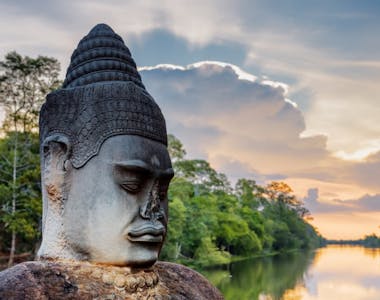
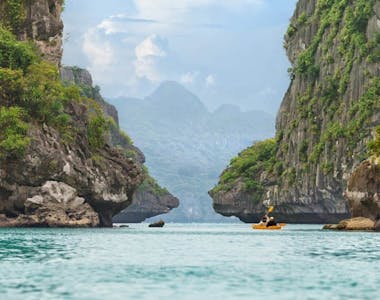
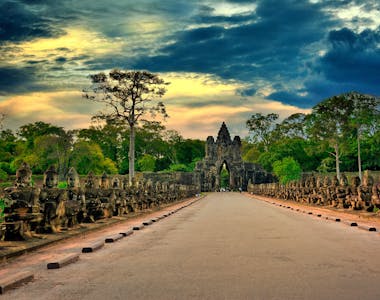
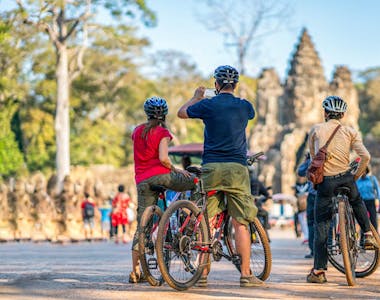
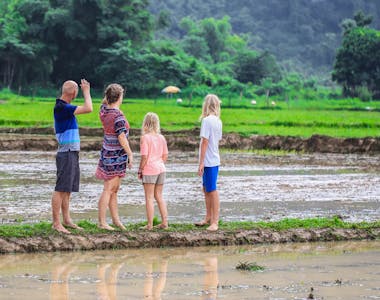
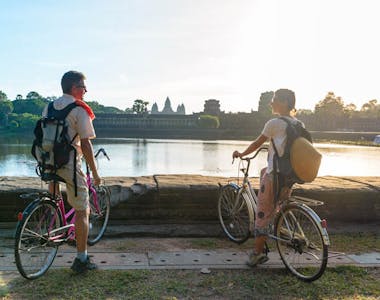
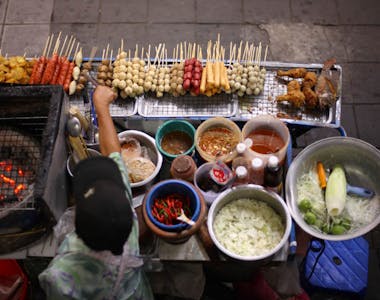
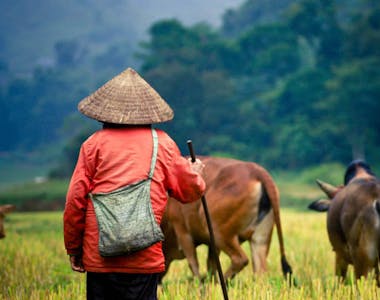
Book With Confidence
Monthly Payments
Spread the costs with no interest or additional fees
Best Price Guarantee
We won't be beaten on price. If you find this adventure at a lower price please get in touch!
Reserve now & pay later
Reserve your adventure today and pay later, free of charge
ATOL protected
Book with confidence
Hold your space today, for free
or book your trip with a deposit and then pay the rest in instalments.
Reserve your flights with us
Add flights to your booking and we'll take care of the rest. You'll get 24/7 support from our team & ATOL protection.
Speak to our experts
Call or email our expert team to find out more and help with ideas and planning.
